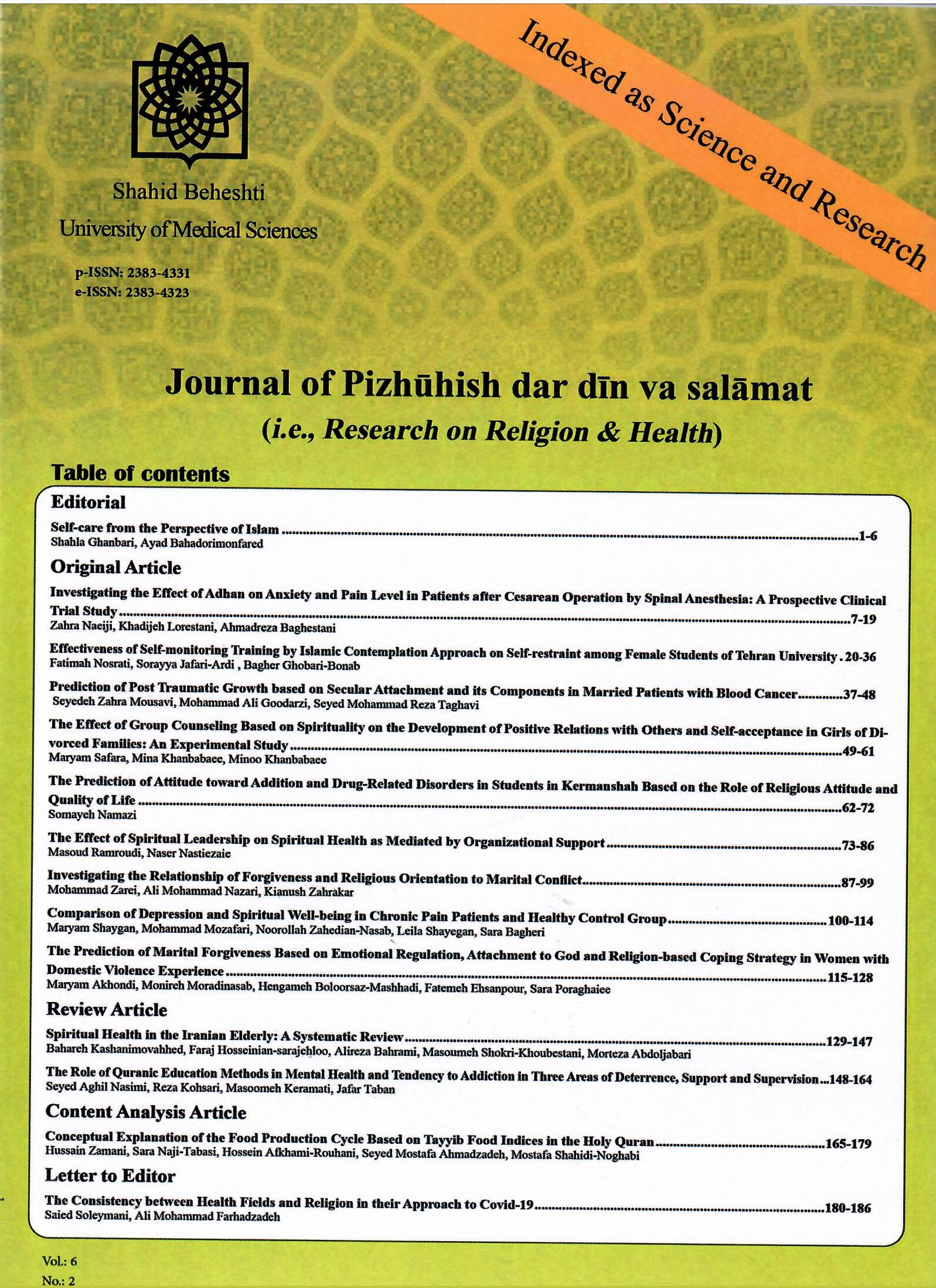پیشبینی بخشودگی زناشویی بر اساس تنظیم هیجان، دلبستگی به خدا و راهبرد مقابلۀ دینمحور در زنان دارای تجربۀ خشونت خانوادگی
پژوهش در دین و سلامت ,
دوره 6 شماره 2 (2020),
13 خرداد 2020
,
صفحه 115-128
https://doi.org/10.22037/jrrh.v6i2.22964
چکیده
سابقه و هدف: ساختار بعضی از خانوادهها شرایط را برای اعمال خشونت علیه زنان فراهم میآورد. خشونت، سلامت و امنیت خانواده را تهدید میکند. پژوهش حاضر با هدف پیشبینی بخشودگی زناشویی بر اساس تنظیم هیجان، دلبستگی به خدا و راهبردهای مقابلۀ دینمحور در زنان دارای تجربۀ خشونت خانوادگی انجام شده است.
روش کار: این پژوهش توصیفی و از نوع مطالعات همبستگی است. جامعۀ آماري شامل تمامی زنان مراجعهکننده به مراکز مشاوره و رواندرمانی شهر تهران در سال 1396 بود که از بین آنان 300 نفر با روش نمونهگیری تصادفی ساده انتخاب شدند. ابزارهای پژوهش شامل مقیاسهای بخشش زناشویی، تنظیم شناختی-هیجانی، دلبستگی به خدا و مقابلۀ مذهبی بود و تحلیل دادهها با استفاده از روشهای آمار توصیفی، ضریب همبستگی و رگرسیون انجام شد. در این پژوهش همۀ موارد اخلاقی رعایت شده است و مؤلفان مقاله تضاد منافعی گزارش نکردهاند.
یافتهها: نتایج پژوهش نشان داد که متغیّرهای تنظیم هیجانی (61/0=r و 05/0>P)، دلبستگی به خدا (48/0=r و 05/0>P) و راهبرد مقابلۀ دینمحور (52/0=r و 05/0>P) با بخشودگی زناشویی در زنان دارای تجربۀ خشونت خانگی رابطۀ مثبت و معناداری داشت و بهصورت معناداری توانست 8/41 درصد از تغییرات مربوط به بخشودگی زناشویی را در زنان دارای تجربۀ خشونت خانگی پیشبینی کند (05/0>P).
نتیجهگیری: با توجه به نتایج مطالعه میتوان گفت راهبرد مقابلۀ دینمحور، دلبستگی ایمن نسبت به خدا و تنظیم هیجان در میزان بخشش زناشویی مؤثر است. بنابراین در برنامهریزیهای مسئولان آشناسازی زنانِ دارای تجربۀ خشونت خانگی با سازههای اسلامی-معنوی و مدیریت هیجان ضروری به نظر میرسد.
استناد مقاله به این صورت است:
Akhondi M, Moradinasab M, Boloorsaz-Mashhadi H, Ehsanpour F, Poraghaiee S. The Prediction of Marital Forgiveness based on Emotional Regulation, Attachment to God and Religion-based Coping Strategy in Women with Domestic Violence Experience. Journal of Pizhūhish dar dīn va salāmat. 2020;6(2): 115-128.https://doi.org/10.22037/jrrh.v6i2.22964
- بخشش زناشویی؛ خشونت خانگی؛ دلبستگی به خدا؛ مقابلۀ دینمحور؛ هیجان
ارجاع به مقاله
مراجع
Vachher AS, Sharma A. Domestic violence against women and their mental health status in a colony in Delhi. Indian journal of community medicine: official publication of Indian Association of Preventive & Social Medicine. 2010;35(3):403.
Gates DM, Gillespie GL, Succop P. Violence against nurses and its impact on stress and productivity. Nurs Econ. 2011;29(2):59-66.
Shams M, Kianfard L, Parhizkar S, Mousavizadeh A. Needs Assessment in Married Women for Designed Empowerment Program to Prevent Domestic Violence Against Women in Ahvaz. 2017; J TOLOO-E–BEHDASHT, School of Public Health, Yazd Shahid Sadoughi Univ Med Sci. 2017; 16(1):89-100. (Full Text in Persian)
Rahpaymaelizehee S, Fallahi B, Jafri Kojouri R. The national policy of iran toward violence against women/A Política Nacional do Iran Para a ViolÊncia Contra as Mulheres. Espaço Jurídico: Journal of Law. 2015;16(2):321-32.
Sheikhbardsiri H, Khademipour G, Aminizadeh M, Fatemian R, Doustmohammadi MM. Factors Related to Domestic Violence against Female Employees in Educational Hospitals Affiliated to Isfahan University of Medical Sciences in 2016. Journal of Hospital. 2018;17(1):45-52. (Full Text in Persian)
Chung M-S. Relation between lack of forgiveness and depression: The moderating effect of self compassion. Psychological reports. 2016;119(3):573-85.
Fincham FD, May RW. Prayer and forgiveness: Beyond relationship quality and extension to marriage. Journal of Family Psychology. 2017; 19(22): 164-78.
Lambert N, Fincham F, DeWall C, Pond R, Beach S. Shifting toward cooperative goals: How partner-focused prayer facilitates forgiveness. Personal Relationships. 2013;20:184-97.
Solak N, Jost J, Sümer N. Effects of System Justification on Emotions in Collective Protests. 15th The Biennial Conference of the International Society for Justice Research; New York City, USA;2014.
Gilbert K, Mineka S, Zinbarg RE, Craske MG, Adam EK. Emotion regulation regulates more than emotion: Associations of momentary emotion regulation with diurnal cortisol in current and past depression and anxiety. Clinical Psychological Science. 2017;5(1):37-51.
Coutinho J, Ribeiro E, Ferreirinha R, Dias P. The Portuguese version of the Difficulties in Emotion Regulation Scale and its relationship with psychopathological symptoms. Revista de Psiquiatria Clínica. 2010;37(4):145-51.
Sabatier C, Restrepo Cervantes D, Moreno Torres M, Hoyos De los Rios O, Palacio Sañudo J. Emotion Regulation in Children and Adolescents: concepts, processes and influences. Psicología desde el Caribe. 2017;34(1):101-10.
Cui L, Morris AS, Criss MM, Houltberg BJ, Silk JS. Parental psychological control and adolescent adjustment: The role of adolescent emotion regulation. Parenting.2014; 14(1):47-67.
Meyer S, Raikes HA, Virmani EA, Waters S, Thompson RA. Parent emotion representations and the socialization of emotion regulation in the family. International Journal of Behavioral Development. 2014;38(2):164-73.
Homan KJ. A mediation model linking attachment to God, self-compassion, and mental health. Mental Health, Religion & Culture. 2014;17(10):977-89.
Kirkpatrick LA. Attachment and religious representations and behavior. 2000.
Ainsworth M, Blehar MC, Waters E, Wall S. Patterns of attachment: A psychological study of the strange situation.Hillsdale, NJ: Erlbaum.1978.
Rashidi M, Sharif Mousavi F, Esmaeili K. The Relationship between Styles of Attachment to God and Forgiveness and Empathy among Female Students in the City of Qom. Health, Spirituality and Medical Ethics. 2016;3(1):18-24.
Beck R. God as a secure base: Attachment to God and theological exploration. Journal of Psychology and Theology. 2006;34(2):125-32.
Azarbaijani M. A Test for Measuring Religious Attitude in the Light of Islam. Methodology of Social Sciences and Humanities. 2002;7(29):36-61. (Full Text in Persian)
Rider KA, Terrell DJ, Sisemore TA, Hecht JE. Religious coping style as a predictor of the severity of anorectic symptomology. Eating disorders. 2014; 22(2):163-79.
Fox RB. Religious identity, religious practices, and spiritual coping in adults undergoing treatment for cancer: University of Kansas, Psychology; 2001.
Pargament KI, Ensing DS, Falgout K, Olsen H, Reilly B, Van Haitsma K, et al. God help me:(I): Religious coping efforts as predictors of the outcomes to significant negative life events. American journal of community psychology. 1990;18(6):793-824.
Guitar AE, Geher G, Kruger DJ, Garcia JR, Fisher ML, Fitzgerald CJ. Defining and distinguishing sexual and emotional infidelity. Current Psychology. 2017;36(3):434-46.
Isanejad O, Baghery A. Phenomenology of strategies of justifying infidelity: Mechanisms to cope with cognitive dissonance of marital infidelity. Journal of Family Counseling & Psychotherapy. 2017;6(2):189-207. (Full Text in Persian)
Fakhri M, Mahdavianfard R, Kimiaee SA. Prediction of the probability of divorce based on avoidant attachment, anxiety attachment and family problem solving skills. Quarterly of Counseling Culture and Psychotherapy. 2018;9(33):207-22. (Full Text in Persian)
Pollard MW, Anderson RA, Anderson WT, Jennings G. The development of a family forgiveness scale. Journal of Family Therapy. 1998;20(1):95-109.
Najafi E, Derivzeh Z, Peivastegar M. The Relationship Between Forgiveness and Marriage Satisfaction in Kermanshahi Couples Iournal Woman & Culture. 2011;3(8):96-108. (Full Text in Persian)
Goussinsky R, Livne Y. Coping with interpersonal mistreatment: the role of emotion regulation strategies and supervisor support. Journal of nursing management. 2016; 24(8):1109-18.
Rabie M, Zerehpush A, Palahang H, Zarie Mahmood Abadi H. Relationship between Components of Cognitive Emotion Regulation and Anxiety Disorders. J Res Behave Sci.2014;11(5):363-74.
Shabahang R, Besharat MA, Nikoogoftar M, Sheykhangafshe FB. Role of Cognitive Flexibility and Emotional Regulation Problems in Prediction of Celebrity Worshipamong University Students. Knowledge & Research in Applied Psychology. 2019;20(75):13-25. (Full Text in Persian)
Rowatt W, Kirkpatrick LA. Two dimensions of attachment to God and their relation to affect, religiosity, and personality constructs. Journal for the scientific study of religion. 2002;41(4):637-51.
Ghobary Bonab B, Haddadi Kuhsar AA, Rashidi A, Javadi S. Relationship among image of God and attachment to God with mental health in parents of exceptional children. Journal of Exceptional Children. 2012;12(3):5-14. (Full Text in Persian)
Wrosch C, Jobin J, Scheier MF. Do the emotional benefits of optimism vary across older adulthood? A life span perspective. Journal of personality. 2017;85(3):388-97.
Grezellschak S, Lincoln TM, Westermann S. Cognitive emotion regulation in patients with schizophrenia: evidence for effective reappraisal and distraction. Psychiatry research. 2015;229(1-2):434-9.
Haghighi F. Correlation between religious coping and depression in cancer patients. Psychiatria Danubina. 2013;25(3):236-40. (Full Text in Persian)
Elumelu TN, Asuzu CC, Akin-Odanye EO. Impact of active coping, religion and acceptance on quality of life of patients with breast cancer in the department of radiotherapy, UCH, Ibadan. BMJ supportive & palliative care. 2015;5(2):175-80.
Kent BV. Attachment to God, religious tradition, and firm attributes in workplace commitment. The Journal of social psychology. 2017;157(4):485-501.
Bradshaw M, Kent BV. Prayer, attachment to God, and changes in psychological well-being in later life. Journal of aging and health. 2018;30(5):667-9.
- چکیده مشاهده شده: 441 بار
- PDF دانلود شده: 377 بار

